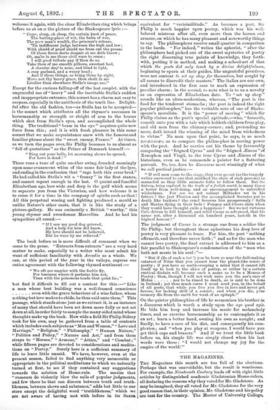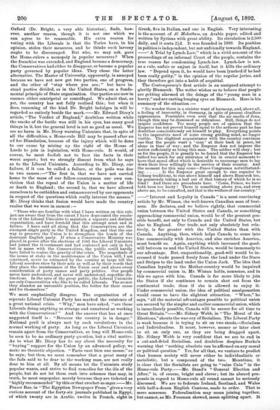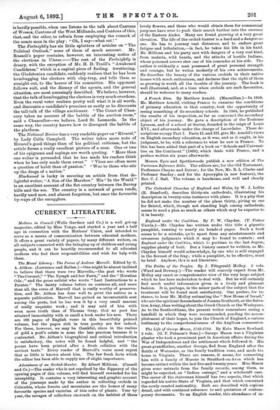THE MAGAZINE.
THE Magazines this month are too full of the elections. Perhaps that was unavoidable, but the result is wearisome. For example, the Nineteenth Century leads off with eight little articles by distinguished academic Gladatonia.n Home-rulers, all declaring the reasons why they voted for Mr. Gladstone. As may be imagined, they all voted for Mr. Gladstone for the very good reason that, iiitheir opinion, Mr. Gladstone and his policy are best for the country. The Master of University College,
Oxford (Dr. Bright, a very able historian), finds, how- ever, another reason, though it is not one which we can agree to be reasonable. His extra reason for voting with the Liberals is that the Tories have, in his opinion, stolen their measures, and he thinks such larceny ought to be discouraged. But who, we may ask, gave
the Home-rulers a monopoly in popular measures ? When the franchise was extended, and England became a democracy, the Conservatives had either to disappear, or become a popular party governed by popular ideas. They chose the latter alternative. The Master of University, apparently, is annoyed
because we have not now got two parties, one of progress, and the other of "stay where you are ; " but have in- stead parties divided, as in the United States, on a funda- mental principle of State organisation. Our parties are now in essence either centripetal or centrifugal. We admit that, as yet, the country has not fully realised this ; but when it does, reasoning of the kind Dr. Bright indulges in will be regarded as entirely beside the mark.—Mr. Edward Dicey's article, "The Verdict of England," doubtless written while the smoke of the battle was still in his eyes, has many good
things in it, but the general level is not so good as usual. We see no harm in Mr. Dicey warning Unionists that, in spite of all the difficulties, a Home-rule Bill may be passed after an ad hoc Dissolution, because of the injury which will be done
to our cause by mixing up the right of the House of Lords to join in legislation, with Home-rule. It would, of course, be most foolish not to face the facts in their worst aspect; but we strongly dissent from what he says as to the Liberal Unionists. According to Mr. Dicey, our failure, if it can be called a failure, at the polls was due to two causes :—" The first is, that we have not carried home to the mass of our fellow-countrymen our own con- viction that the repeal of the Union is a matter of life or death to England ; the second is, that we have allowed ourselves to be outbidden and ontmanceuvred by our opponents in respect of the questions which really interest the masses."
Mr. Dicey thinks that fusion would have made the country realise that we were in earnest :—
"Those who are familiar with what I have written on this sub- ject are aware that from the outset I have deprecated the resolu- tion of the Liberal Unionists to maintain a separate and distinct organisation, and have foretold that this attempt must end in failure. I have said all along that the Conservatives are the strongest single party in the United Kingdom, and that the one way to preserve the Union is to strengthen the hands of the dominant English party. If when a Conservative Ministry was placed in power after the elections of 1886 the Liberal Unionists had joined the Government and had coalesced not only in fact but in name with the Conservatives, the public could hardly have failed to realise the gravity of the crisis. The magnitude of the issues at stake in the maintenance of the Union will, I am convinced, never be estimated by the country at large till the Liberal seceders show by their acts as well as by their words that they place the maintenance of the Union over and above every consideration of party names and party politics. Our people never have understood, and never will understand, superfine dis- tinctions. In the eyes of the great public, the Liberal Unionists are only Conservatives who like to be called Liberals. The sooner they abandon an untenable position, the better for their cause and for themselves."
We most emphatically disagree. The organisation of a separate Liberal Unionist Party has marked the existence of a great national crisis. "Why," men have asked, "are these Liberals doing anything so strange and unnatural as working with the Conservatives ? " And the answer that has at once suggested itself is : "Because the country is in danger." National peril is always met by such revolutions in the normal working of party. As long as the Liberal Unionists remain apart from the Conservatives, so long will Home-rule be seen to be no ordinary party question, but a vital matter. As to what Mr. Dicey has to say about the necessity for " buying " support for the Union by an advanced policy, we make no theoretic objection. "Paris vaut bien une messe," as he says; but then, we must remember that a great many of the fads said to be dear to the working man, are not really dear to him at all. By all means let the Unionists study popular wants, and strive to find remedies for the ills of the people, but do not let them rush into schemes that may, in truth, be most unpopular, merely because they are ticketed as
"highly recommended" by this or that crochet-monger.—Mr. Fraser Rae, in "The Egyptian Newspaper Press," gives a very curious account of the forty-six journals published in Egypt, a which twenty are in Arabic, twelve in French, eight in Greek, five in Italian, and one in English. Very interesting is the account of Al Mokattam, an Arabic paper, edited and written by Syrians with great ability. Its circulation is 2,500
daily, and it costs Ad. It was founded in 1889. Its position in politics is independent, but not unfriendly towards England. —" A Trial by Lynch-Law," which is a vivid account of the proceedings of an informal Court of the people, contains the true reason for condemning Lynch-law. Lynch-law is not, as a rule, unfair or unjust in itself, but it kills the ordinary law. "Depend upon it, he would have been lynched if he had been really guilty," is the opinion of the regular juries, and they therefore get into a habit of acquittal.
The Contemporary's first article is an unsigned attempt to
glorify Bismarck. The writer wishes us to believe that people are getting alarmed at the doings of the "young man in a. hurry," and are casting longing eyes on Bismarck. Here is his summary of the situation :—
"No wonder there is a sinister want of harmony, and, above all, a feeling of insecurity, in Germany, in spite of present cloudless. appearances. Pessimists even aver that the air smells of Jena, though this may be-dismissed as ridiculous. Still, things do not inspire confidence. Too many people are of opinion that the Emperor has not proved himself equal to the arduous part he has doubtless conscientiously set himself to play. Everything points. to the imperative need of some strong guiding mind, no longer visible. The slightest acquaintance with the country convinces one that the people want a 'man' at their back in peace, let alone in time of war ; and the Emperor does not impress the nation sufficiently as being this man. The soldier Will obey ; but as for the people, it is greatly to be feared that the Emperor has talked too much for any utterance of his in crucial moments to have that moral effect which is desirable to encourage men to lay down their lives willingly in the service of their country. And. the moment for this may come—Peace Congresses notwithstand-
ing Is the Emperor great enough to rise superior to Coburg traditions, to rise above himself and above Bismarck too, by generously taking a leaf out of that history of which he is so fond ? And there are precedents here. Come, Prince, we have both been too hasty ! There is something above you, and even above me, to be consulted, and that is the welfare of our country.'"
—" Interest and Loyalty in Canada" is a most convincing article by Mr. Wiman, the well-known Canadian man of busi- ness. He declares, and we believe rightly, that commercial union between the United States and Canada, or something
approaching commercial union, would be of the greatest pos- sible benefit, not only to Canada. and the United States, but also to England. Our trade, not only absolutely but rela- tively, is far greater with the United States than with Canada. Anything, then, which helps Canada to come into line commercially with America, and also enriches America, must benefit us. Again, anything which increased the good- will between us and the United States, would be immensely our advantage. But, unquestionably, good-will would be in- creased if trade passed freely from the land under the Stars and Stripes to the land under the Union Jack. The idea that Canadian loyalty to the Mother-country would be impaired by commercial union is, Mr. Wiman holds, nonsense, and in this we agree with him. Canada is far more likely to join the States if she continues to remain shut out from the continental trade, than if she is allowed to enjoy it.
Under commercial union, the idea of political amalgamation would cease to have the slightest attraction. "When," he says, "all the material advantages possible to political union are secured by the simpler and earlier commercial union, which is immediately possible, Canada will be secure for all time to Great Britain."—Mr. Sidney Webb, in "The Moral of the Elections," shouts the war-cry of Socialism. The Liberal Party is weak because it is trying to sit on two stools,—Socialism and Individualism. It must, however, sooner or later elect to sit on only one, as they are being dragged apart. Mr. Sidney Webb is very confident that we are to end in a cut-and-dried Socialism, and doubtless despises Burke's warning that "nothing absolute can be affirmed on any moral or political question." Yet, for all that, we venture to predict that human society will never either be individualistic or socialistic, but a compound of the two. Meantime, it is clear that the Socialists are going to "raise Cain" in the Home-rule Party.—Mr. Stead's "General Election and After," is, of course, bright and clever ; but its absurd pro- posals in regard to Home-rule all round cannot be seriously discussed. We are to federate Ireland, Scotland, and Wales with half-a-dozen English Cantons, made to order. That is mere nonsense. Federalisation may mean joining together, but cannot, as Mr. Freeman showed, mean splitting apart. It is hardly possible, when one listens to the talk about Cantons of Wessex, Cantons of the West Midlands, and Cantons of this, that, and the other, to refrain from employing the remark of the comic man in the play : "Oh, I say—what rot ! "
The Fortnightly has six little splutters of articles on "The Political Outlook," none of them of much account. Mr. Russell's paper contains, however, an interesting notice of the elections in Ulster.—The rest of the Fortnightly is dreary, with the exception of Mr. H. D. Trail's "Awakened Candidates," which is a capital piece of fooling. Swettering, the Gladstonian candidate, suddenly realises that he has been humbugging the electors with clap-trap, and tells them so straight out, to the horror of his committee. His opponent follows suit, and the dismay of the agents, and the general situation, are most amusingly described. We believe, however, that the talk of humbugging the electors is very mach overdone. Even the rural voter realises pretty well what it is all worth, and discounts a candidate's promises as easily as he discounts the tall-talk of the village auctioneer. "The Court of Chan- cery takes no account of the babble of the auction-room," said a Chancellor—we believe, Lord St. Leonards. In the same way, the country knows bow to disregard the babble of the platform.
The National Review has a very readable paper on " Rivarol," by Lady Colin Campbell. The writer takes more note of Rivarol's good things than of his political criticism, but the article forms a really excellent picture of a man. One or two of his epigrams and sayings are worth quoting. "More than one writer is persuaded that he has made his readers think when he has only made them sweat." "Vices are often more a question of habit than of passion." "Woe to those who stir up the dregs of a nation."
Blackwood is lucky in securing an article from that de- lightful writer, "A Son of the Marshes." His" In the Weald" is an excellent account of the flat country between the Surrey hills and the sea. The country is a network of green roads, hardly used now, and almost forgotten, but once the favourite by-ways of the smugglers.




































 Previous page
Previous page